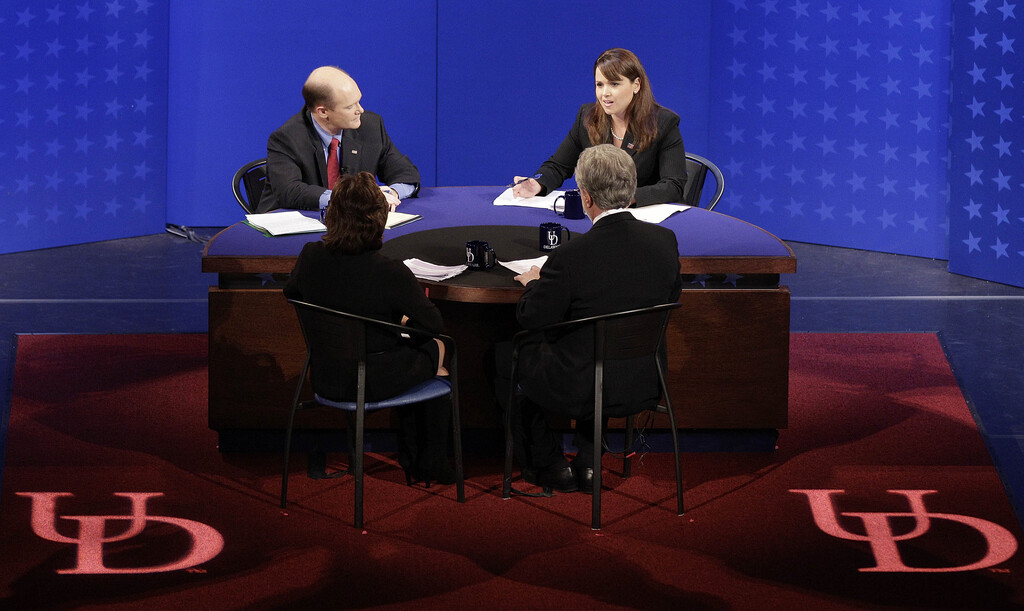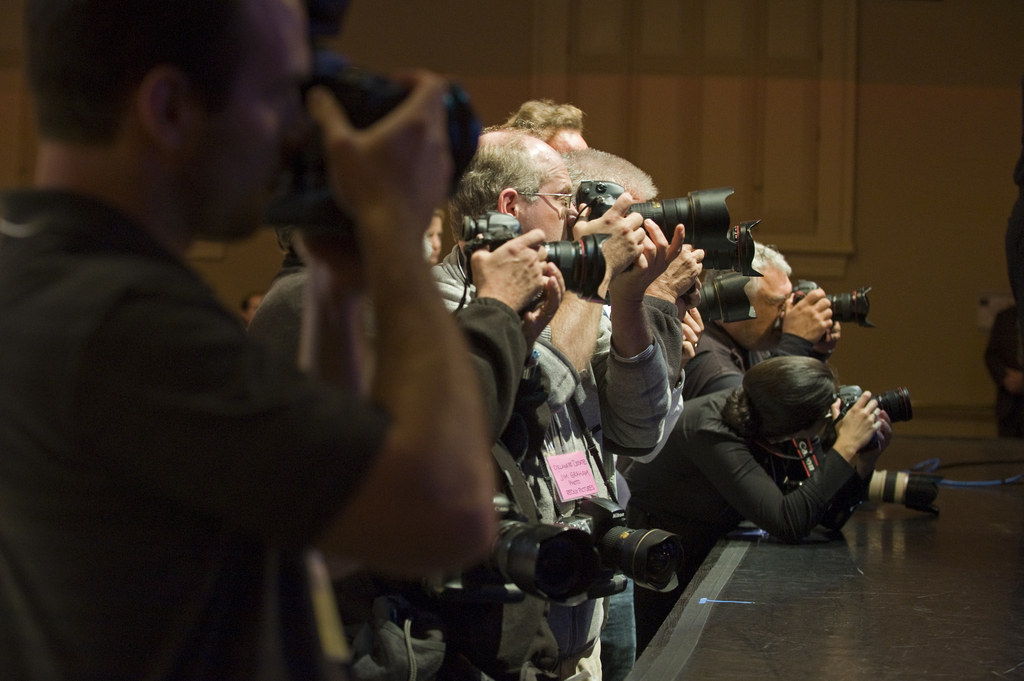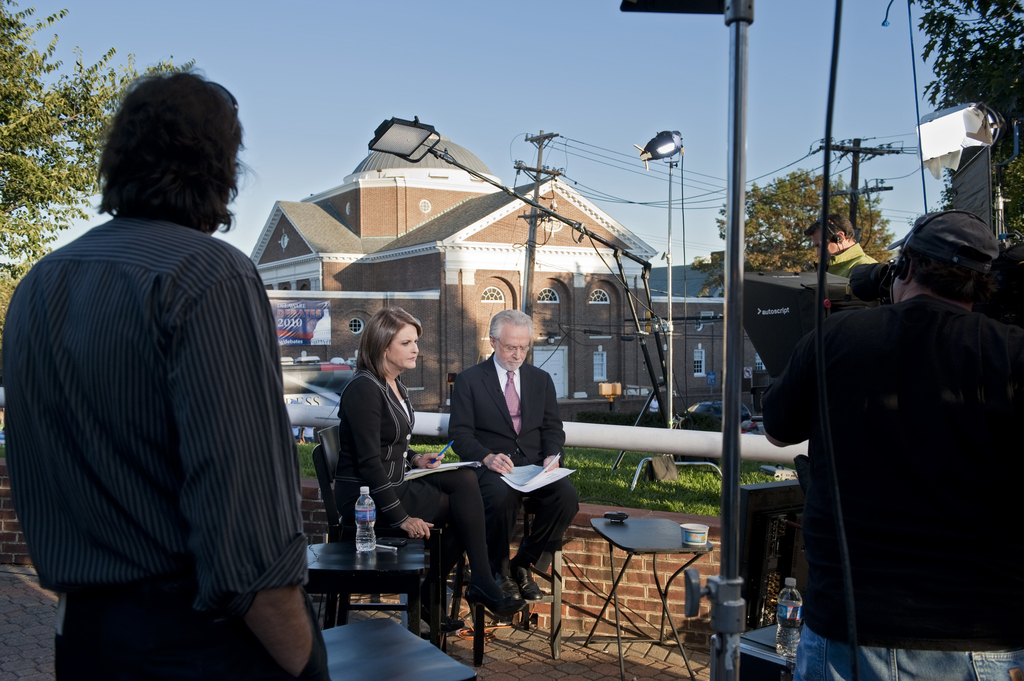Delaware Debates 2010 Reflection : Celebrating 10 Years: Delaware Debates 2010
The University of Delaware lives up to its role as “Epicenter of Politics”

By Sean O’Connor and Justin Richards, University of Delaware juniors and interns for the University of Delaware’s Center for Political Communication
Photos by Kathy Atkinson, Evan Krape and Kevin Quinlan
Watch the video. Read the 2010 UDaily story.
Visit the “Celebrating 10 Years” page, which highlights how the CPC has advanced political understanding and civic engagement through research, scholarship, and events.
APRIL 6, 2020″Just weeks before its inaugural Delaware Debates event in October 2010, the University of Delaware reaffirmed its reputation as the epicenter of politics. The election of Barack Obama in 2008 triggered a conservative political wave that turned Delaware’s 2010 U.S. Senate election upside down. As moderate Republicans watched their popularity in the GOP dwindle, the heavy favorite to win the Republican nomination in Delaware”former U.S. Representative and Governor Michael Castle”lost his bid for U.S. Senate in Delaware’s primary election on September 14.

Castle’s defeat by tea party darling Christine O”Donnell triggered shockwaves in Delaware”one of the most Democratic-leaning states in the country”where Castle had been expected to beat his Democratic challenger Chris Coons.
Over the next four weeks, the seismic political event led to a historic debate at the University of Delaware that captivated not just the state, but the entire nation. Delaware First Media (now Delaware Public Media) and UD’s Center for Political Communication hosted the live prime-time debate between O”Donnell and Coons on October 13, 2010. CNN, one of the largest news organizations in the world, covered the event, with CNN’s Wolf Blitzer and Delaware First Media’s Nancy Karibjanian moderating. O”Donnell and Coons faced off on national and state issues and truly tested the viability of the tea party movement at a national level’something the entire country was waiting to see.

Reflecting on the days leading up to the debate, Karibjanian, who now serves as the director of the Center for Political Communication, said, “It was intense. From the primary results to the day of the debate, the shift in mindset put me in overdrive. This went from from a debate with the widely acknowledged next U.S. Senator Mike Castle to a nationally watched debate testing the stamina of the tea party.” Topics ranged from U.S. military involvement in Afghanistan and education reform to healthcare reform and illegal immigration. “As a moderator you aren’t expected to have answers,” Karibjanian said. “But you do need to understand the issues since it falls on you as a moderator to challenge or correct inaccurate information.”
Earlier in the day, Blitzer and colleague Gloria Borger broadcast from a makeshift outdoor studio that overlooked Mitchell Hall from across South College Avenue. Blitzer later anchored The Situation Room with Wolf Blitzer from the same site.
More than 160 broadcast and print journalists visited the University, including an unprecedented international presence. “Journalists came from about 40 to 50 countries around the world, who were all covering the US election. For them, it was a symbol of what was going on in the United States at the time,” said Ralph Begleiter, who managed the event as then director of the CPC.
Origins of “Epicenter” and the CPC
In 2008, Bloomberg News described the University of Delaware as the “epicenter? of the United States presidential race, crediting the involvement of such notable UD alumni as Vice Presidential candidate Joe Biden, McCain campaign senior strategist Steve Schmidt, and Obama campaign manager David Plouffe. Bloomberg reporter Nicholas Johnston wrote, “The academic epicenter of this year’s presidential election isn’t, as in some years past, Harvard or Yale. It’s located between Baltimore and Philadelphia at the University of Delaware.”
In 2003, Ralph Begleiter, founding director of the CPC, first proposed an interdisciplinary academic center for the social sciences at the University of Delaware. It became a reality when the Center for Political Communication opened its doors in January 2010. The intention of the center was to promote research and teaching among social science disciplines; scholarship; and a focus on public and civic engagement. “I had in mind the concept of opening students? eyes to the connections between what they are studying in a university classroom and what goes on in the real world of politics and media,” said Begleiter.
Delaware Debates “provided a solid foundation for the CPC,” said Karibjanian. Under the eyes of the national and international community, “Delaware Debates earned the CPC and the University of Delaware a stellar reputation.” Ten years later, the CPC continues to be a beacon of political research, teaching, and constructive conversation”hosting programs such as the annual National Agenda speaker series and the biannual Delaware Debates for gubernatorial and congressional candidates.
The 2010 debate helped cement UD as the “epicenter of politics? and the Center for Political Communication still brings the title justice, said Begleiter. “We can look back 10 years later and instantly recognize how valuable the idea of a Center for Political Communication is to the University, and to the public at large. Therefore, I would encourage people to see it as something definitely worth supporting in the future.”
